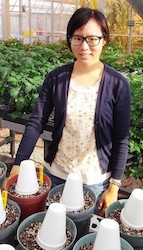 The National Potato Council (NPC) is pleased to announce the winner of the 2015-15 $10,000 academic scholarship. Shunping Ding, a PhD. student in Plant Pathology at the University of Wisconsin-Madison, is a graduate student who earned the award for her interest in research benefiting the potato industry.
The National Potato Council (NPC) is pleased to announce the winner of the 2015-15 $10,000 academic scholarship. Shunping Ding, a PhD. student in Plant Pathology at the University of Wisconsin-Madison, is a graduate student who earned the award for her interest in research benefiting the potato industry.
Ding is an enthusiastic researcher and dedicated student, who has proven to be a leader both inside and outside of the classroom. Her extensive research experience, combined with memberships in several professional organizations, demonstrate that Ding has invested heavily in becoming an expert in her field of study. Her current focus is on enhancing control of the potato early blight complex (EBC), which is a common fungal disease that results in significant annual loss to the potato industry. NPC anticipates that her current and future research into potato diseases will greatly benefit the industry by offering insight into this ongoing issue the industry faces.
“Shunping has genuine interest in and dedication to plant disease research in both basic and applied areas. She is driven to solve practical problems, like potato early blight, that have great implications, such as crop loss, which ultimately results in loss of income for producers, loss of stability for local and regional economies, and ultimately a loss in food supply,” said Amanda Gevens, Associate Professor and Extension Plant Pathologist of the Department of Plant Pathology with the University of Wisconsin-Madison. “She is a professional, respectful student with the capacity to make significant contributions to the scientific and agricultural community.”
Ding’s strong work ethic won the approval of the selection committee, as well as her academic record and desire to improve the potato industry.

“I am very thankful for this scholarship. It is a great honor and encouragement to me, and will help provide me with training opportunities to enhance my research. My goal is to help the U.S. potato industry to mitigate loss in potato production by better managing diseases in an economically
and environmentally responsible manner,” said Ding.
